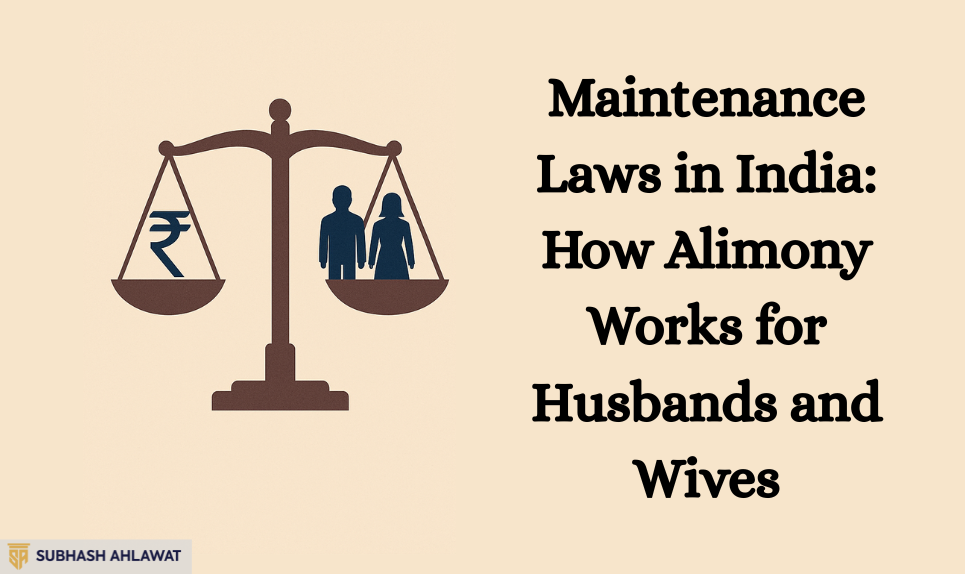Maintenance Laws in India: How Alimony Works for Husbands and Wives

Marriage is not only a personal relationship but also a legal and financial bond. When the marriage breaks down, questions about financial support become crucial. In India, maintenance (also called alimony or spousal support) is a legal right that ensures the financially weaker spouse or dependents are not left destitute after separation or divorce.
This blog explores maintenance laws in India, explains how alimony works for both husband and wife.
Legal Framework Governing Maintenance in India
India does not have a single, uniform family law. Maintenance rights are scattered across personal laws and general statutes. Some of the key provisions include:
Hindu Marriage Act, 1955 (HMA)
– Section 24: Interim maintenance during proceedings.
– Section 25: Permanent alimony after divorce.Code of Criminal Procedure, 1973 (CrPC) – Section 125
– Provides a quick remedy for wives, children, and parents who cannot maintain themselves.Protection of Women from Domestic Violence Act, 2005 (PWDVA)
– Allows women to claim monetary relief in cases of domestic violence.Muslim Law
– The Muslim Women (Protection of Rights on Divorce) Act, 1986 governs post-divorce maintenance.Christian & Parsi Laws
– Indian Divorce Act and Parsi Marriage and Divorce Act have provisions for alimony.Special Marriage Act, 1954 (SMA)
– Provides maintenance rights for marriages outside personal laws.
Bharatiya Nagarik Suraksha Sanhita (BNSS)
India has recently replaced its colonial-era criminal laws. The Bharatiya Nyaya Sanhita (BNS), Bharatiya Nagarik Suraksha Sanhita (BNSS), and Bharatiya Sakshya Adhiniyam (BSA) have come into effect.
Under BNSS, the old CrPC Section 125 (maintenance) is retained but renumbered as Section 144 BNSS. The scope is broadly similar:
A person with sufficient means must maintain his wife, children, and parents.
Neglect or refusal to maintain can lead to a legal claim.
Key Change: BNSS emphasizes faster trial timelines and modernization, aiming to speed up family disputes that earlier dragged on for years.
Who Can Claim Maintenance?
Maintenance in India is not limited to the wife. The law is broader and includes:
Wife – Entitled to claim if they are unable to maintain themselves.
Husband – In rare cases where the wife is financially stronger, courts have allowed husbands to seek maintenance.
Children – Both legitimate and illegitimate minor children, and sometimes unmarried daughters.
Parents – Elderly parents can seek support from children.
Types of Maintenance / Alimony
Indian courts grant maintenance in different forms:
Interim Maintenance
– Temporary relief during court proceedings.Permanent Alimony
– A long-term financial arrangement after divorce.Lump Sum vs. Periodic Payments
– Either one-time settlement or monthly/quarterly payments depending on circumstances.
Factors Courts Consider While Granting Maintenance
Courts do not follow a fixed formula. Instead, judges evaluate:
Financial status and income of both spouses.
Standard of living enjoyed during marriage.
Age and health of the claimant.
Custody of children and associated expenses.
Conduct of the spouses (e.g., cruelty, desertion, infidelity).
The goal is to strike a balance between need and capacity to pay.
Alimony Rights of Wives in India
Traditionally, Indian law focused on supporting wives post-divorce. Some key rights include:
Right to claim maintenance under HMA, SMA, CrPC, and PWDVA.
Right to residence in the matrimonial home under Domestic Violence Act.
Courts have ruled that even an earning wife can claim maintenance if her income is insufficient to maintain the standard of living she had during marriage.
Landmark Case: In Rajnesh v. Neha (2020), the Supreme Court issued guidelines for determining maintenance, including disclosure of assets and income by both spouses.
Alimony Rights of Husbands in India
Though less common, husbands may also seek maintenance:
If the husband is incapacitated or unemployed and the wife is earning significantly more.
Courts have started recognizing gender-neutral maintenance, emphasizing fairness.
Case Example: Some High Courts have ruled in favor of unemployed or disabled husbands, ordering wives to pay maintenance.
This shift reflects changing gender roles in modern India.
Calculation of Maintenance Amount
There is no rigid formula. Courts generally calculate maintenance based on:
25% to 33% of the paying spouse’s income (a broad benchmark).
Standard of living during marriage.
Dependents such as children or parents.
Example:
If a husband earns ₹1,00,000/month, the wife may be awarded around ₹25,000–₹33,000 depending on her financial condition.
Process to Claim Maintenance / Alimony
The procedure usually involves:
Filing a Petition before the appropriate family court or magistrate.
Submitting documents like marriage proof, income details, and expenses.
Court hearings where both parties present evidence.
Interim relief may be granted quickly; permanent orders take longer.
Execution of order ensures payment through court if the spouse refuses.
Best Divorce Lawyer and Maintenance Lawyer in Faridabad
Choosing the right lawyer is critical in maintenance and divorce cases. A skilled lawyer ensures:
Proper presentation of income and expense proofs.
Strong representation in court hearings.
Faster resolution of disputes.
If you are searching for the best divorce lawyer in Faridabad or need the best maintenance and alimony lawyer in Faridabad, Advocate Subhash Ahlawat is a trusted name.
With years of experience in family law cases, he has successfully handled complex disputes involving divorce, child custody, alimony, and domestic violence. His client-focused approach and deep knowledge of maintenance laws make him one of the top-recommended lawyers in Faridabad.
Conclusion
Maintenance laws in India aim to protect dependents from financial hardship after separation or divorce. Both husbands and wives can claim maintenance, depending on circumstances.
If you are in Faridabad and facing issues related to alimony, divorce, or maintenance, consult an experienced family lawyer. Advocate Subhash Ahlawat, known as one of the best divorce and maintenance lawyers in Faridabad, can help you secure your rights and represent your case effectively.


